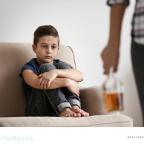
Referrals from NSPCC helpline to agencies in South West surge during pandemic
- Over 4,700 referrals made from NSPCC helpline to external agencies in the South West last year – a 41% rise from 2019/2020
- Adult’s mental health and behaviour was the top concern, followed by neglect, emotional and physical abuse showing a worrying rise too
- The charity reveals plans for Childhood Day which will bring the nation together to celebrate play, raise money and keep children safe
A sharp rise in child welfare referrals being made from the NSPCC helpline to external agencies such as the police or children’s services in the South West in the last year – against the backdrop of the pandemic - has been revealed by the child protection charity.
There were 4,794 referrals made by the helpline to external agencies in the region in 2020/21 – a 41% increase compared to 2019/20 when there were 3,393 referrals.
Referrals are made when concerns reported to the helpline are considered serious enough to warrant further investigation.
The top reasons for referrals being made go unchanged, with concerns relating to parental and adult health and behaviour leading to 1,525 referrals to South West based agencies. This includes worries about parental alcohol and substance misuse, domestic abuse and parental mental health.
Across the UK a record number of adults with concerns about children called the NSPCC in the last 12 months, as contacts to its helpline surged by nearly a quarter.
The figures echo concerns from the charity’s frontline teams that the pandemic has increased the risks of abuse and neglect, with children both more vulnerable and out of sight of people who can keep them safe.
The NSPCC is now warning that with most children back in schools and society, the hidden harms they experienced during the lockdowns will become visible.
In the short term, they must address the harm and trauma children may have faced in the past 12 months, but Governments must also use the opportunity to invest in keeping children safe and well in the future.
Sisters, Chloe* and Debra*, found a young boy crying on the kerb outside their home and called the NSPCC Helpline for advice. They stayed on the phone for three hours to ensure he was taken to safety.
Debra* said: “He told her (Chloe*) that he was scared of his mum – that she hits him and he’d been suicidal over it. He kept bursting into tears and explained he’d run away because he’d broken his TV and was worried about what his mum would do.
“I was really aware that Covid lockdown was affecting young people’s mental health and being stuck at home in abusive circumstances were making things worse.
“I called the number and felt confident doing it. Seeing how upset he was, I knew I was doing the right thing. The practitioner was very calm and pleasant and asked lots of questions about the situation. We wanted to get the right help and support and the NSPCC wanted to make sure he was safe.”
To build a better future for children, no matter where they live, the NSPCC is urging Governments to focus on prevention and protecting children from neglect and abuse both online and offline, delivering a supportive environment in the early years, and ensuring services are available to help children recover from traumatic experiences.
For the UK Government this means:
- Setting out how it will deliver the Best Start in Life Vision, including investment in rebuilding the health visitor workforce and new accountability mechanisms to ensure new parents and their babies receive consistent health visiting services with access to community-based targeted support.
2. Delivering early intervention support when it’s needed by addressing the funding gap in children’s social care, enhancing mental health and emotional wellbeing support in schools, and expanding support for families in the community. To help prevent and protect children from online harms, the UK Government needs to deliver the Online Safety Bill introducing a Duty of Care on tech firms, to be enforced by a statutory regulator.
3. Helping children recover from sexual abuse by bringing together funding streams for therapeutic and justice services to deliver support “under one roof” through local Child Houses, and ensuring children who have experienced domestic abuse can access specialist, community-based services wherever they live.
Sir Peter Wanless, NSPCC CEO, said: ‘’We’ve been hearing first-hand about the immense pressures families have faced during the pandemic and the heavy toll that has taken on children and young people. For some children, this has included experiencing abuse, bereavement and other harm.
“The record number of contacts to our helpline reinforces the need for Governments across the UK to put children at the heart of their recovery plans. These must go beyond education and address the harm some have experienced so the pandemic doesn’t leave a legacy of trauma for children.
“But this isn’t just a job for our Governments. Everyone has to play their part in keeping children safe. And that’s why we’re planning Childhood Day on 11 June when we’ll celebrate childhood and encourage people to get involved in making sure all children grow up happy and safe.”
The campaign will celebrate childhood by bringing the nation together to play, raise money and help keep children safe. It will put a spotlight on what it is to be a child, whilst also showing we must work together to prevent abuse and protect children.
The NSPCC helpline is staffed by trained professionals who can provide expert advice and support for adults with concerns about a child, or for parents, carers and professionals looking for information or guidance. To get in contact, call 0808 800 5000, email help@nspcc.org.uk or fill in our online form.












